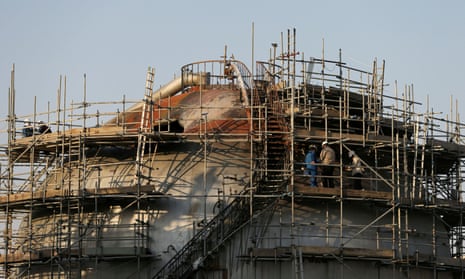The UK now believes Iran was responsible for a major attack earlier this month on Saudi Arabian oil facilities, Boris Johnson has said, also raising the possibility that the British military could become involved in helping secure the Saudis against future aggression.
Speaking to reporters on his plane en route to the UN general assembly (UNGA) in New York, the prime minister said there was “a very high degree of probability” that Iran was behind the drone and missile attack two major oil installation on 14 September.
Stressing his desire to avoid any escalation in the rumbling crisis, Johnson said he saw the UK’s role as “serving as a bridge between our European friends and the Americans” on the issue.
The US and Saudi Arabia have previously said they believe the attack was carried out by Iran, and not by Houthi rebels battling Saudi forces in Yemen, who Iran says were to blame.
Johnson was due to hold joint talks with the French president, Emmanuel Macron, and the German chancellor, Angela Merkel, while in New York, in the guise of the so-called E3 group, which formulates policy on Iran between the nations. Neither France nor Germany has so far said who it believed was responsible.
The prime minister was also due to hold bilateral talks with Iran’s president, Hassan Rouhani, on Tuesday, where he will discuss the Saudi attack and the continued detention of UK-Iran dual nationals including Nazanin Zaghari-Ratcliffe.
Speaking on the plane Johnson said one of his key objectives at UNGA was to help “bring the world together in response to what happened in Saudi Arabia, in our management of Iran”.
He said: “I can tell you that the UK is attributing responsibility with a very high degree of probability to Iran for the Aramco attacks. We think it very likely indeed that Iran was indeed responsible, using both drones and cruise missiles.
“Clearly, the difficulty is how do we organise a global response, what is the way forward. We’ll be working with our American friends and our European friends to construct a response that tries to de-escalate tensions in the Gulf region.”
Johnson went on: “On what kind of action we can take, you’ll have seen that the Americans are proposing to do more to help to defend Saudi Arabia, and we will be following that closely.
“And clearly, if we are asked, either by the Saudis or by the Americans, to have a role then we will consider what way we could be useful.”
Questioned whether this meant a response could involve UK military forces, he said: “We will consider in what way we can be useful, if asked, depending on what the exact plan is.”
But he declined to specify any possible action, saying on the idea of tighter sanctions: “There is certainly a case for responding together, and that’s what we’re going to do.”
Separately, a British government official told reporters that the Houthi’s claim to have carried out the attack was “implausible”.
He said: “Imagery from the site of the attack shows remnants of Iranian-made ground-attack cruise missiles. The scale, sophistication and range of the attack is inconsistent with the Houthi’s capability.”
